Visual Ethnography Learning Synthesis: Pubs, People, and Pastors
Pubs, People, and Pastors
So where is the better place to go, a church or a pub? The answers to this question will vary, depending on whom you ask. One thing I can say with quite a bit of certainty; more people attend pubs than they do churches in Britain. And why not? Perhaps pubs accomplish more than churches do in relation to serving people at times.

A Typical London Pub
In 1981 after several years in ministry, I became so burned out that I quit my job as a youth pastor at a mega-church. I was so hurt and confused that I quit going to church altogether for several months. My wife began to go to a church with her mom where Chuck Swindoll was the pastor. One Sunday she came home excited and told me that Swindoll said in his sermon that sometimes a bar is a better place to be than a church if you just want someone to listen to you without judgment. I will never forget that day. I think Swindoll was right. Churches are sometimes very unsafe places, particularly if one wants to be transparent. A few weeks later, I returned to that church with my wife and began a process of healing that has slowly continued to this day. That church became my pub.
This week, I received an e-mail from one of my students. In the e-mail, he thanked me for being a safe person and a person who listens to others. He then told me that he had written a blog post that he wanted me to read. The title of his post is “Rebel without a Cause.”[1] He writes:
Today I was leaving a store and was stopped by a man asking for a buck or two and we shared a cigarette and as many words as you could fit in 20 minutes. He told me about his alcoholic girlfriend of 4 years and his family and friends all of which seemed to be on crack or heroin at some point. He himself told me about his experience with crack as well as the physical ailments he is cursed with. I enjoyed every syllable that poured from this dude’s lips. He kept repeating, “God don’t like ugly and that’s some ugly shit.”
I know that the teen years are supposed to be for finding yourself and all the wonderful identity crises that come along with it and the twenties are for thinking you know yourself and beyond that you should know who you are.
Jack Kerouac condemns editing and proper grammar. He says it ruins the meaning of the writing.
I don’t have a clue how to define myself. I smoke. Occasionally I smoke pot and drink from time to time. It’s kind of exciting not being able to define yourself but at the same time it’s terribly confusing. I have a tattoo of a coffee bean now that I like.
I go to a Christian college in Portland Oregon that would tell you they want you to be yourself. But being there, I would say that they want you to be yourself if you follow their close revisions. If you smoke pot, they don’t want to know. If you smoke cigarettes, you’d better do it off campus (and that route off and back on campus could be labeled “the walk of shame”). I find that the times I felt I belonged the most on this campus were times that I didn’t feel I belonged in my own skin. It’s hard to find true sincerity there, the kind that really gets dirty. People are more preoccupied with being sexy Christians or sexy intellectuals.
James Deans character in “Rebel without a cause” says, “Boy if I had one day where I didn’t have to be all confused, I didn’t have to feel that I was ashamed of everything, If I felt that I belonged some place…”
I’m tired of stigmas. I wish I could fit in just as much if I was open as when I pretend wearing clean clothes and keeping from smelling like smoke.
There are a few ways this comes out: People either hide all of their dirt and they feel ashamed and it eats at them or they try to beautify their dirt being a strange kind of transparent that really isn’t transparent at all. I wish dirt could be dirt and it could be loved. I don’t believe that God wants you to polish your dirt OR dust it under the rug. I believe that God likes ugly. I believe that God loves ugly– That he desires the ugly– that he waits for it.
My e-mail response to my student was “This is brilliant, honest, and courageous. I would love to get together and talk about your blog.” He made himself vulnerable to me by sharing some pretty deep issues. In my twenties, my response would have been judgmental and preachy. I now realize that my response today is more Christ-like. I have a relationship with this young man that will allow for many deep conversations in the coming years, perhaps some of those conversations will be in a pub over a pint.
“The Mitre” and “The Flowers in the Forest”
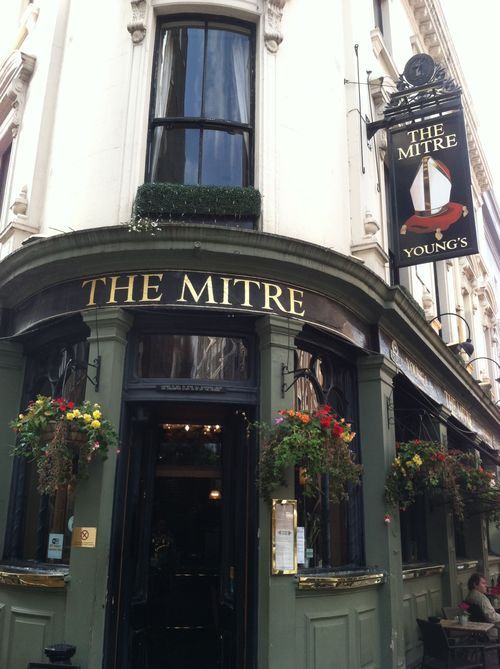
The Mitre
One of my fondest memories while on our London Advance was sitting in “The Mitre,” the corner pub near our hotel, enjoying a pint with my cohort and professors. The depth of conversations was memorable. This was some of the best fellowship I have ever had; in fact, all our conversations around dining tables were rich with theological and anthropological exchanges. Commensality is a term I learned this semester that has really stuck with me and that I have constantly applied in my life. The term has been defined as, “The exchange of sensory memories and emotions, and of substances and objects incarnating remembrance and feeling.” [2] Commensality blossomed whenever we ate and drank together in London. It also continued whenever my cohort walked together[3]; and in London we did a lot of walking!
I arrived in London two days early, so I could scope out the lay of the land. Consequently, I did a lot of walking for two days, experiencing and observing the British culture. One of the first things I noticed was that women in London wear flat shoes. They need to; one does a lot of walking in this wonderful city. The second thing I noticed was the large number of pubs. And at certain times of the day – every day – the pubs were filled with people. Why? Was it for the beer and other drinks? Yes. But are there other reasons that people frequent British pubs? The following clips may help to answer this question.
- The Great British Pub Vodcast:
http://www.youtube.com/watch?v=2Xzoi0GMEKk
- The British Pubs:
http://www.youtube.com/watch?v=hr_ZVSys1t8
- The English Pub, Two Thousand Years of History:
http://www.youtube.com/watch?v=UR7wuxeI8oQ
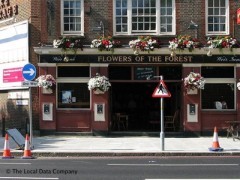
Flowers in the Forest
On the day before the Advance began, I was on my way to the British War Museum when I decided to step into a pub (my first one in England) for a bite and a brew. I was the only one in the place besides the bartender whose name was Barry; the pub was called “Flowers in the Forest.” I decided that I would interview Barry for this ethnography project. Frankly, I was quite nervous. Would he think I was some stupid American? Would he take me seriously? After my lunch, I finally screwed up my courage enough to begin the interview. I explained that I was in London for classes in a doctoral program. Then I asked if I could ask him some questions, so I could learn more about his culture. Following is a report of our interview.[4]

Barry
Bill: How is life in London for you?
Barry: So much is changing right now, especially government policies and the culture around us. But it is better now than it was 10 years ago.
Bill: How do you feel about your government leaders?
Barry: Not a good feeling. Schools are not good any more. It seems like the government doesn’t care about the average person.
Bill: How would you describe a good leader? Has England ever had a good leader or good leadership?
Barry: A good leader looks after his own people. Good leaders care. England has not had a good leader for a long while. Politicians look after their own people. We have been involved in wars that do not belong to us. Immigration has had a very negative effect of the country, especially the Muslims. They have overloaded our already failing healthcare system. Obviously, our leaders are not doing a good job of taking care of their own people.
Bill: Is it hard to make a living in London?
Barry: The job situation is bad. It is hard to make a living but not impossible. The prices have all raised 15-20 percent, but the wages have not gone up.
Bill: What do you think about America? American politics? American tourists?
Barry: America is powerful. Americans boss others around. Brits follow Americans in many ways, so there are similarities between our cultures. But the American culture is confusing to me. However, I like American tourists and have made good friends with many of them.
Bill: What do you think that the average Brit thinks about church and religion?
Barry: The largest church is the Church of England. Religion is shrinking in Britain. I don’t have much to do with religion, but I am Catholic so I go to mass a couple times a year and was married in the church. There are large numbers of people in my church sometimes, but most of them are immigrants, non-Brits.
Bill: What would you like me to know about your country?
Barry: We are involved in too many wars. Too many people believe the media, but I wonder if the media actually reports the truth. When the Soviet Union collapsed, it created an interesting set of new problems for Europe. Our biggest problem in Britain is the influx of Muslim immigrants. I am worried about the immigration problem and of the Islamization of Britain and Europe.
Bill: What football team do you root for and support?
Barry: Arsenal for 30 years. They are the team I stick with through thick and thin.
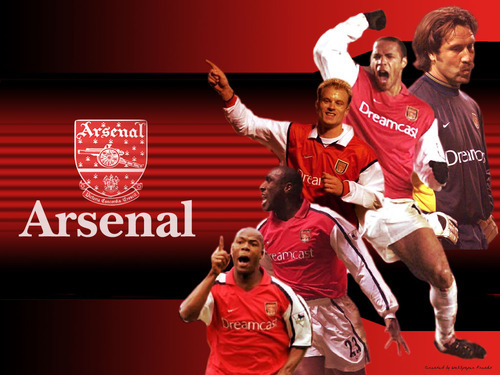
Arsenal Football Club
Barry is a good, honest, White, English man. His perspective of Britain reflects who he is. London’s diversity is not a positive change for him. He is not fond of churches, nor is he an avid churchgoer. Also, he is obviously not a fan of his government or of Britain’s involvement in war. He likes his job as a barman. It gives him a chance to meet new people, to make new friends, and to listen to others. He is a humble man. I enjoyed being with him and learned a lot from him. My only regret is that I did not go back to see him again during the Advance. If I ever return to London, one of my goals is to visit him again. I know where he works and I sense that he will still be there the next time I am in London.
Cohort Theology
My cohort and professors had many good chats while in London. In these ten days together, we really grew close (this is a brilliant part of the Leadership and Global Perspectives program.) One of the topics that we discussed together was theology, and we had some rousing conversations about this topic around the dining room tables and in “The Mitre” pub. David Ford talks about several types of theology in his book, Theology: A Very Short Introduction. In a section of his book, “Five Types, Two Extremes” he discusses five types of theology present today.[5] His two extremes are those who have a worldview that does not include theological beliefs (Type 1) and those who want to live a Biblical lifestyle completely, fundamentalists (Type 5). In between are three views that are those found in the mainstream of academic theology. As I consider my cohort members’ theological perspectives, I would guess that many of them are in the Type 4 range, perhaps some 4 ½’s. I would probably describe myself as a Type 3 ½. I used to be a Type 5 but have moved away from an extreme view the older I have become. I am OK with this; however, sometimes the old Type 5 in me raises its ugly head, making me feel ashamed of whom I have become.
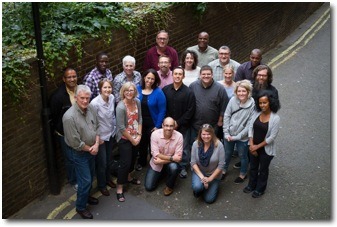
LGP4 Cohort
Inspirational Pastor-Leaders
In the introduction to the book Leading from Within, Parker Palmer says: “Leadership is everyone’s vocation, and it is an evasion to claim that it is not. When we live in the close-knit ecosystem of community, everyone follows and everyone leads. Leadership, I now understand, simply comes from the territory called being human.”[6] I love this quote. Everyone is a leader if he or she is a human, particularly a humble human. Two truly humble leaders I had the privilege of meeting in London were Jeremy Crossley and Steve Chalke. I said of these men in my recent academic essay:[7]
Both of these men modeled the kind of leadership that I could follow. They were each relational, humble, flexible, inspirational, simple, and truly spiritual. Both of these men made a deep impression on me. I was most interested in their use of narrative (story). Chalke spoke for two hours, but it felt like two minutes. He was not afraid to embrace his own story, which was extremely refreshing. He also offered a lot of common sense. What he shared was not complicated, but it was real, believable, and relational. When he was finished, I wanted to talk with him for hours. I wish I would have.
Chalke and Crossley both talked about “holistic good news” and about doing ministry “right here – right now.” They also both talked about “inclusivism” over “exclusivism.” They were each doing ministry, not just talking and theorizing about it, and they were both willing to get their hands dirty in the nitty-gritty parts of life. They both exuded obvious humility and confidence at the same time. Chalke and Crossley also agreed that ministry is truly about “throwing oneself into real people.” Steve Chalke went so far as to say that this is what leadership is all about. I was mesmerized, moved, inspired, and challenged. I knew that I was standing in a holy place.

Steve Chalke
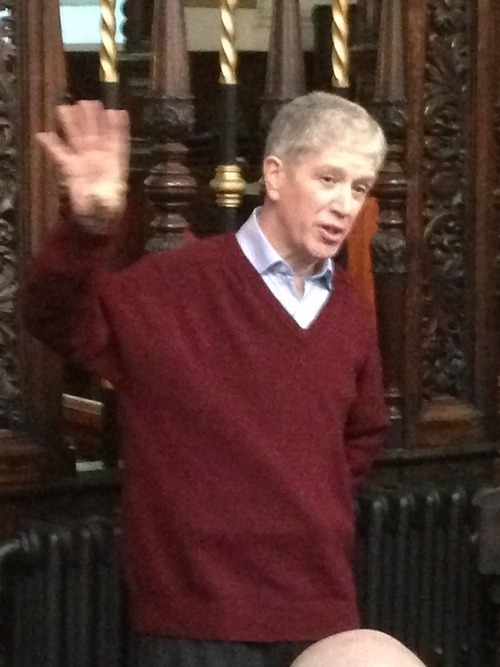
Jeremy Crossley
Hearing these two men was a life changer for me. Having had so many poor pastoral role models over the past several years, it has been rare for me to meet a pastor I respect and appreciate. The insights Crossley and Chalke gave me in the short time I spent with them showed me a lot about British Christian culture. Jeremy Crossley is high church, yet he serves all people at all times – even if it is only for 15 minutes per meeting! He has adjusted his ministry to meet the pastoral needs of his congregation and of his community. To see a man so willing to serve and so passionate about Jesus impacted my heart. I do the same kind of thing with my students. Meeting Jeremy made me realize how important this kind of ministry really is. Steve Chalke is from a completely different church background; he is a minister in the Baptist church and founded a large ministry called Oasis. What I received from Steve was also his love for Jesus and his love for ALL people. He is not afraid to meet the needs of real people in the real world, including gay people. His work is holistic – not just pastoral and spiritual – and at the heart of his work are concepts of justice and inclusion. Chalke says, “The principles of justice, reconciliation and inclusion sit at the very heart of Jesus’ message.”[8] This was a great encouragement to me. He, I believe, allows God be God and does not worry too much about what others think. This gave me so much hope. One does not have to only minister to spiritual needs to be doing the work of the Kingdom. I already knew this in my head, but after hearing these two men, I can honestly say that these truths are now beginning to live in my heart again.
Putting it Altogether
Pubs, people, and pastors were my takeaways from our London Advance. My cohort members have become a new family to me. I cannot imagine how close we will be after three years of chats and blog posts, three intercultural Advances, and graduating together (if we all persevere). But I know that I am glad to know this great group of people, and I got to know them better while we sat with our pints listening, sharing, laughing, and making memories together. I am also thankful for the George Fox faculty and staff who planned and organized this event. They too are humans who love, care, and live exemplary lives. They have all touched me deeply and modeled customer-service and professionalism in ways I have never seen before. It was one of my most joyful memories to chat in The Mitre with each of them over a brew. Finally, I am grateful for all the leaders and presenters we met while in London. They opened my heart to a new way of looking at my rebounding faith and gave me hope that there is good leadership out there; sometimes you just need to look in the right places.
Bibliography
Dobrenen, Bill. “Where Have All the Leaders Gone?” Academic Essay, George Fox University, December 14, 2013.
Ford, David F. Theology: A Very Short Introduction. Oxford University Press: London, 2000.
Jones, Sam. “Stop Treating Gay People as Pariahs, Evangelical Minister Tells Church.” The Guardian.com: London, Tuesday January 15, 2013. Accessed December 21, 2013.
Intrator, Sam M. and Scribner, Megan. Leading from Within: Poetry that Sustains the Courage to Lead. San Francisco, CA: Jossey-Bass, 2007.
Pink, Sarah. Doing Sensory Ethnography. Sage Publications Ltd.: London, 2009.
[1] E-mail message from Warner Pacific College student, December 20, 2013.
[2] Sarah Pink, Doing Sensory Ethnography. (Sage Publications Ltd.: London, 2009) 73.
[3] Ibid., 76.
[4] Interview with barman “Barry” at Flowers in the Forest pub in London, September 24, 2013.
[5] David F. Ford, Theology: A Very Short Introduction (Oxford University Press: London, 2000) 21-28.
[6] Sam M. Intrator and Megan Scribner, Leading from Within: Poetry thet Sustains the Courage to Lead (San Francisco, CA: Jossey Bass, 2007) xxix.
[7] Bill Dobrenen, “Where Have All the Leaders Gone?” (Academic Essay, George Fox University, Portland, OR, 2013), 7-8.
[8] Sam Jones, “Stop Treating Gay People as Pariahs, Evangelical Minister Tells Church” (The Guardian.com: London, Tuesday 15 January, 2013, accessed December 21, 2013, http://www.theguardian.com/world/2013/jan/15/gay-people-pariahs-minister-church/print
Leave a Reply
You must be logged in to post a comment.